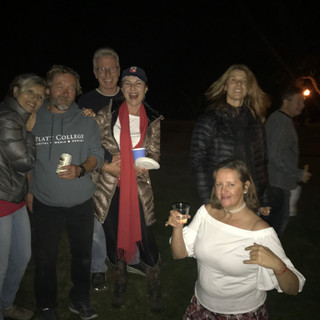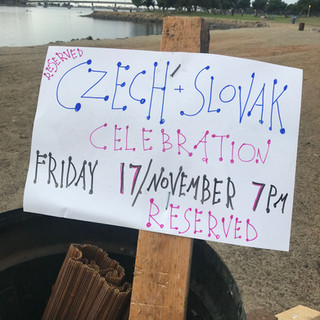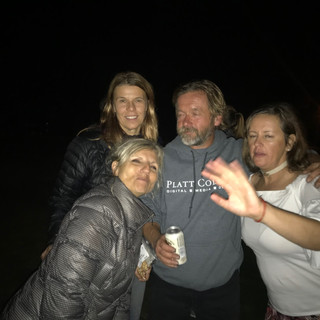A Czech Story that was both Tragic and Heroic Lead to the Creation of the International Day of Stude
- Dec 6, 2017
- 6 min read

For twenty year, each November, the Czech&Slovak community in San Diego celebrates the fruit of the Velvet Revolution: Freedom. This year about 80 of us celebrated by the traditional bonfire. And here are some of my thoughts of that day.
November 17, 1989, the first day of the Velvet Revolution, became a monumental day of my life. Ten days later we booted out the Commies and ushered in Freedom.
The 1989 Revolution started as a celebration of the International Day of Students that commemorates the bravery of the Czech Charles University students who opposed the Nazi occupation of Czechoslovakia in 1939. The story of the origin of the International Day of Students', that stems from this event, is intriguing. Here it is.
From the beginning of 1938, Hitler had many demands on Czechoslovakia, mainly to give up about twenty percent of its territory for which Germany coined a name Sudetenland (named after the Latin name of the mountains on the Czech-German-Polish border). It was a region occupied for centuries by Czechs but mainly about 3 millions of Germans. Our President Eduard Beneš replied to Hitler’s unjustified pleadings by offering to arrange ANY rights the German population may lack. However, President Beneš was not willing to give up a territory that has been a home to the Czechs and minorities since the 6th century. Hitler, frustrated by not getting what he wanted, called on September 30, 1938 a conference to Munich, to get help on this issue. The invited countries were France represented by Daladier, England by Chamberlain, Italy by Mussolini and Germany by Hitler. Czechoslovakia was not invited to the negotiating table.
Munich Conference decided (dictated) that Czechoslovakia must agree with the proposed annexation of the Sudetenland. Papers were signed, hands were shaken, Czechoslovakia was given up by her own allies to Hitler as an appeasement. Chamberlain was convinced he averted the war, France was scared to be the only defender of Czechoslovakia. Yet, France had a military agreement with Czechoslovakia. To make the situation even sadder for Czechoslovakia, Polish ambassador to France Juliusz Lukasiewicz told the foreign minister of France George Bonnet, before the conference even took place, that if France will try to help in any way Czechoslovakia, Poland will not. Further, Lukasiewicz told the Soviets several weeks later that if they would try to help out Czechoslovakia, Poland would oppose it. Instead, Poland joined Germany and annexed a Teschen region on the northern border of Czechoslovakia.
Czechoslovakia was on her own. Betrayed fully by France and Great Britain, left all alone in the hands of Hitler.
The war, as we know, was not averted. Hitler was not satisfied as he promised he would. He received a part of Czechoslovakia, he got Austria that became a part of Reich via Anschluss in March of 1938 and he grew greedy. Greedy for power, greedy for territory, greedy to create Europe under his command, purified of unwanted. Czechs were on the list of undesirable along with others.
Winston Churchill, a staunch opponent of Hitler appeasement, wrote about this incident in his postwar memoirs, comparing Germany and Poland to vultures landing on the dying carcass of Czechoslovakia. Churchill writes that "over a question so minor as Teschen (Těšín), they [the Poles] sundered themselves from all those friends in France, Britain and the United States who had lifted them once again to a national, coherent life, and whom they were soon to need sorely [he means during and after the war]. ... It is a mystery and tragedy of European history that a people capable of every heroic virtue, gifted, valiant, charming, as individuals, should repeatedly show such inveterate faults in almost every aspect of their governmental life." (Winston S. Churchill (2002). The Gathering Storm: The Second World War, Volume 1. RosettaBooks LCC. p. 290.)
Hitler moved with full force to erase Czechoslovakia from the map. President Beneš was forced to resign on October 5, 1938. He went to exile to England. Emil Hácha was appointed a new president. On October 10, 1938 Czechoslovakia was forced to accept the Munich Agreement. Sudetenland is annexed, Heinrich Heinlein is successfully establishing a Nazi party in Sudetenland.
On March 14, 1939 our new President Hácha was invited to meet with Hitler. Hácha arrives to Berlin. Hitler has him wait for hours as he is watching films. Finally, at 1.30 AM Hitler accepts Hacha. Without any sugaring, Hitler, with the help of Goring, explains to Hacha that the only right decision he can make for his country is to give Czechoslovakia up to Germany and allow it be a part of the German Reich. He is promised an autonomy. Goring adds that if Hacha will not accept, within minutes the Prague castle along the St. Vitus Cathedral will be flying in the air, destroyed by the German bombs. During the meeting, Hacha suffers a heart attack and kept conscious only by injections. He is further told that German army is already on the borders of Czechoslovakia. Hacha, half dead, signs the dissolution of Czechoslovakia. Later is forced to sign Norimberg's Laws advising the devastation of the Czech Jews.
Czechoslovakia was taken over by Germans on March 15, 1939, and became a part of a Greater German Reich as a Protectorate of Czech and Moravians administrated by the Nazi Germany while Slovaks created an independent state on March 14, 1939.
Six months later after the German occupation of Czechoslovakia, on October 28, 1939, the Czech students were celebrating the 21. anniversary since the independence of Czechoslovakia achieved in 1918.The celebration turned into an anti-Nazi protest. The Germans quickly suppressed the demonstration and killed one medical student and a university employee. A funeral of the killed student, Jan Opletal, took place on November 15, 1939. The endless procession of his last journey became quickly an anti-German protest. Germans subdued the protest and two days later, on November 17, 1939, closed indefinitely the Czech universities, killed nine students and professors without a trial and 1,200 of them sent to the concentration camps.
After the atrocities, the students did not quit the fight. They sent a word about the incidents to England from where many Czechs and other nationalities fought Hitler. Because Germans dismantled the Central Association of Czechoslovak Students, Czechs fighting in England with a tremendous help of President Benes in exile there, tried to renew the organization. The idea to commemorate the victims of the German atrocities in Prague inspired an idea to establish a day that would remember the bravery of the students as it was the first public opposition to the Nazi Germany. After much of promotion and support of international students organizations, an International Day of Students was established and a proclamation, signed by 14 nations, was drafted on November 17, 1940. It was a success mainly of Lubor Zink, Vaclav Palecek, Pavel Kavan and Lena Chivers, a Vice President of British and Wales students organization.
"We, students of Great Britain and India and its territories,, North and South America, the USSR, Belgium, Czechoslovakia, France, Greece, China, Holland, Norway, Poland, Yugoslavia and all free nations, to honor and commemorate the tortured and executed Czech students who were the first to raise their voices to reject Nazi oppression and condemn the occupation of 1939, proclaim November 17 as International Students' Day."
And thus an International Day of Students came about. Not everyone who celebrates that Day knows of its origin, but we do and we celebrate with vigor all of the people who stand against injustice.
Just like we did on that cold November 17, 1989, celebrating those Czech heroic students from 1939 and what they did 50 years ago. And perhaps by remembering what they did filled our spirits with desire for our own fight against oppression, oppression by our own people forcing on us an ideology that needed for its success to take away from us freedom and other decencies of our life.
I am happy I contributed with my strong voice and determination to the fight for freedom. I made it through unharmed as I took part in a Velvet Revolution. To go day after day to the streets of Prague and scream for freedom was not a heroic deed by any means. But it was my personal fight for freedom that I won. And to be surrounded by people who felt and thought and fought the very same way as I did, is feeling that has no competition to be ever topped.
My apology for not having the beautiful group photos while were singing our national anthem....the photographer is at large!!








































































Comments